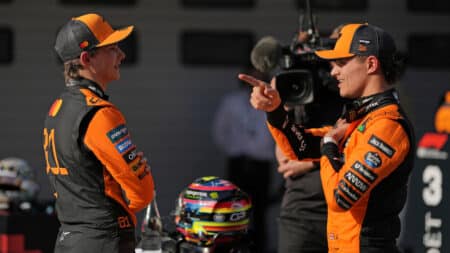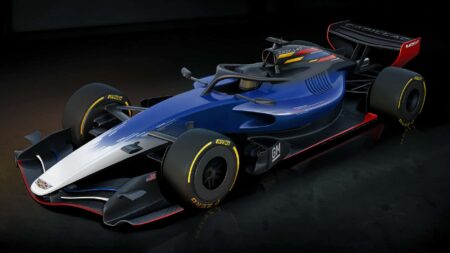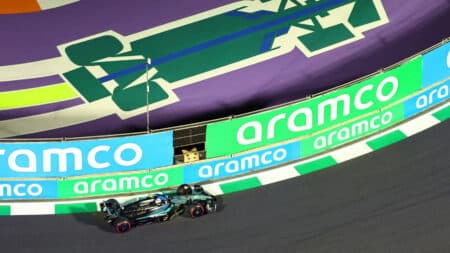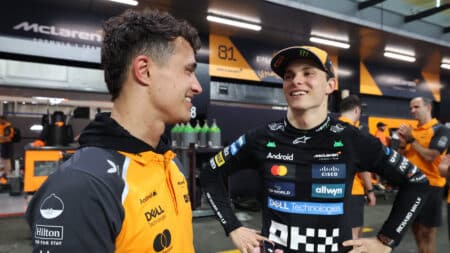
Norris must deal with Piastri's pace – or suffer Mark Webber's fate
As Oscar Piastri moved into the championship lead, his manager Mark Webber's example should serve as a warning to Lando Norris, says Mark Hughes
Five races, four wins. After all those long wilderness years, Jenson Button is having a Schumacher start to the season, and Bernie Ecclestone must be quietly rejoicing that his plan to award Olympic-style medals after each race, to have the World Champion automatically the man with the most victories, was rejected – for now, anyway – by the FIA. On that basis, Button might well have had the title won by July or something.

As it is, Formula 1 continues with an unsatisfactory point-scoring system which puts far too little premium on winning, the FIA having predictably chosen to ignore the much more sensible system proposed by the Formula One Teams’ Association (which is, of course, ‘the enemy’). Consequently, although Button has a healthy 14-point lead in the World Championship, it by no means reflects his superiority in the season to date.

In happier days Lewis Hamilton said – ad nauseam – that he was ‘living the dream’, but that was before he had been through any bad times. For Button it has all been very different, and there must surely be times when Jenson needs to pinch himself, to be sure his life in 2009 is real. For Barcelona there was a revised aero package from the Brawn team, and it was a success, Button saying it had enabled them to keep their advantage intact.
Now that the diffuser rules have been cleaned up, and the European season has begun, all the teams have been flat out on new aero packages, trying to close the gap to Brawn. Given that there is now a season-long testing ban, inevitably this makes for a somewhat fraught time on Fridays at the Grands Prix, when new pieces are assessed for the first time.

Some are clearly making rather better progress than others. In Spain Ferrari, for example, was much more competitive than previously, with Felipe Massa qualifying fourth, and running third for much of the race. McLaren, though, looked pretty much at sea, and Hamilton was a picture of dejection as he declared his car worse than in Bahrain. Had the aero changes worked? “Nope…” Mercedes must be happy indeed that it agreed, late in the day, to go to Ross Brawn’s aid, and supply his new team with engines.

If any team is currently able to offer any sort of real challenge to Brawn, it is Red Bull, in spite of the fact that the Adrian Newey-designed cars still lack the ‘trick’ diffuser used not only by Brawn, but also by Toyota and Williams. Mark Webber finished a good third at Barcelona, beaten only by the Brawns, and Sebastian Vettel was also in the mix all afternoon.
At the post-race press conference Rubens Barrichello’s disappointment was plainly evident. He and Button are ideal team-mates, in that they are good friends, yet intensely competitive with each other, but clearly this was a race that Barrichello had expected to win. He started the race with more fuel than Button, yet took the lead on the run to the first corner, and looked very settled at the front of the field.

It was unfortunate for Rubens that accidents on the opening lap (involving Trulli, Sutil, Buemi and Bourdais) brought out the safety car for four laps while the mass of carbon fibre debris was cleared away. Inevitably that compromised Barrichello’s hopes of breaking away, but still he looked comfortable enough until mid-race.
Brawn’s intention had been to put both its cars on a three-stop strategy, which it felt sure was the fastest way. As it was, it was decided, at the time of the first stops, to put a lot of fuel into Button’s car, and to bring him in only once more.
“That made me very nervous at first,” said Jenson, “because we really had been sure three stops was the way to go. My car felt as heavy as hell, but all I could do was push as hard as possible, and fortunately for me it worked out. I’ve never been particularly good at Barcelona, and I really didn’t come here expecting to win. When it goes well, it really goes well, doesn’t it?”
Brawn GP, as I have said, is a happy outfit, very different from the Ferrari team of a few years ago, when Jean Todt was in charge, and Ross (Brawn) was technical director, and the unfortunate Barrichello was frequently ordered to play a supporting role, to survive on crumbs falling from Michael Schumacher’s table. “It’s much more friendly here than it used to be at Ferrari,” Rubens said of his current team, “but I tell you, I won’t follow team orders any more…”
There was no suggestion of any such thing on Sunday, but it was perhaps inevitable that the scenario should awaken memories of the past. “I drove as hard as I could today,” Barrichello said, “but on my last set of tyres the pace just wasn’t there. They were the hard set, of course, but even so I felt there was a problem with my car somewhere. Early in the race I felt I had it in the bag, but in the end I was very happy to be second.”

If Ferrari performance was distinctly improved at Barcelona, still there was evidence of procedural sloppiness not there in the Todt-Brawn era. In the first segment of qualifying, Kimi Räikkönen, who had been very quick on Saturday morning, set a time he thought good enough to make it through to Q2, and decided not to go out again, to be sure of having enough new tyres for the all-important Q3. Big mistake: in the last minute Kimi was leapfrogged by several drivers, and therefore started 16th.
Extraordinarily, no one at Ferrari told Räikkönen to go out again, and when one remembers that exactly the same happened with Massa in Malaysia, one wonders quite what is going on in the team these days.
In 2008 Räikkönen won the Spanish Grand Prix, after starting from pole. He hasn’t won a race since.
Still, at least there were signs that Ferrari has turned something of a corner in terms of regaining pace. By no means was its car a match for the Brawn at Barcelona, but then neither was anything else. J Button, as I said, must be pinching himself, suddenly in the best car after too many years in the worst. And he is driving it quite beautifully.

As Oscar Piastri moved into the championship lead, his manager Mark Webber's example should serve as a warning to Lando Norris, says Mark Hughes

General Motors has pushed back its F1 entry as an engine supplier to 2029, but what does it mean?

As Mercedes dropped down the F1 order in Saudi Arabia, team boss Toto Wolff found a hope in Kimi Antonelli's performance for the team

Zak Brown is still adamant on his approach that Lando Norris and Oscar Piastri are ‘number ones’ at McLaren. But how long will it be before history repeats itself and takes a sour turn?